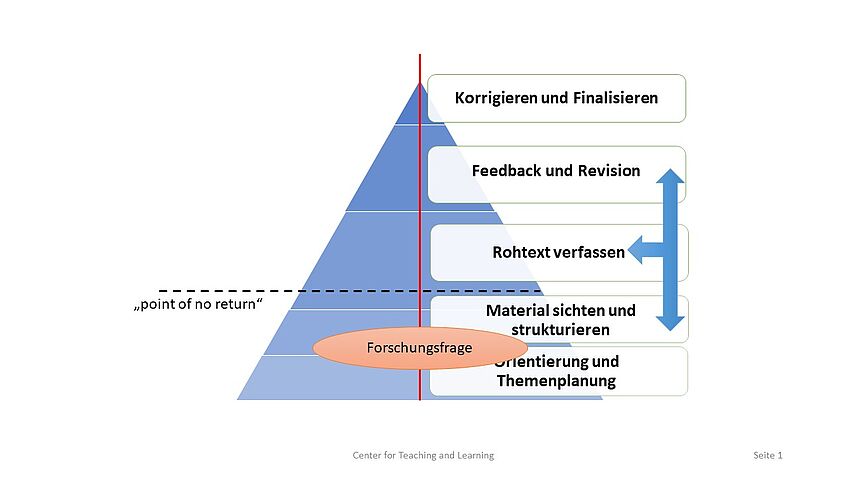How do I start?
Academic writing is a skill you can learn - by means of repetition and practice. An important point for acquiring the skill of academic writing is to know what to treat in which chapter of the bachelor's paper. An academic (writing) process always starts with a question: Without asking questions it is impossible to start doing research. This guide focuses on the question as to how to commence the process of writing your bachelor's paper.
Your writing process does not start when you have put down the first word but at the moment you decide to attend a (bachelor's) seminar. In the course of this process you will face different tasks that require a variety of reading and writing techniques. In addition, feedback during the individual stages of your writing project will focus on different aspects.
Process-oriented writing didactics defines several distinct (writing) stages. Depending on the model applied, the writing process is represented in different degrees of detail. One of the most common models divides writing projects into five stag
1. Orientation and topic planning
2. Reviewing and structuring of sources
3. Drafting
4. Feedback and revision
5. Correcting and finalising
These stages do not follow a linear path - they are cyclic and are repeated as often as needed. You can safely assume that the drafting stage will take about twice as long as stages 1-2 and 4-5. Take care to schedule enough time for the individual stages of your writing project.

Figure 1: Stages of a writing project, adapted by K. Dreo, according to Wolfsberger (2007) and Girgensohn & Sennewald (2012).
In the first stage, your focus is on finding an adequate topic and on orientation within your discipline – either based on the seminars you have already attended or on books you find in the relevant specialised libraries. You can also use the online research tools of the Vienna University Library (u:search) and the catalogues connected with it. After you have decided on a topic and have read up on the relevant literature you need to narrow down and formulate a research question[1], which will then guide your continued literature search.
As soon as you have formulated the research question, the second stage begins, during which you structure your sources, and collect and prepare data. You then develop a structure for the further process. During the third stage, you start drafting a version of your text in which you put your research in writing for the first time [2]. The point of no return (see Figure 1) aims to remind you that there is a certain point when literature searches and reading become less important, and you should start writing in order to complete your paper on time. Ask for feedback (fourth stage) as soon as you have completed the draft (or parts of it). Once you have received feedback, integrate it into your paper and edit the text in alignment with the feedback [3]. The last stage of the writing process is dedicated to finalising. Your paper is now being fine-tuned: You check your wording against academic standards, correct your spelling and grammar, format the paper and make it ‘ready for print’.
Writing a paper is a complex process which is closely linked with the steps of your research design. Bear in mind that you need sufficient time and that you should start to develop your research question at a fairly early phase. It is of key relevance for your ‘main thread’, for writing with a clear objective in mind, and for your research. A precise and well-deliberated research question helps you to make your paper coherent and to relate both the theory and the method to the question. As a rule, in the best possible case (if you have read up on the subject very thoroughly), you will be able to write two pages of high quality during an eight-hour day. These pages should then be at an adequate academic level in terms of content, structure and language.
Please don't forget that nobody is able to write a perfect paper in one go. It requires a great deal of know-how, effort and revision to master this process. Intentionally block out your ‘inner censor’, and obtain feedback as often as possible – from different people with different expertise. Their reactions to your text will help you to progress, together with your paper, and to acquire the skill of academic writing – a useful key competence for your future studies.
[1] The research question is the basis of your paper and will guide both your literature search and your writing. To put it simply, drawing up an academic paper means writing down the steps you have taken to answer your research question.
[2] Depending on the type of paper and form of data collection, parts of the draft may also be drawn up during the first and second stages.
[3] Depending on how easy to read and to the point your first version is, you will need to go through several feedback and revision cycles. This is all part of the writing process and should not put you off. Each feedback will improve your text further.
Tips
- Writing processes are highly individual, and each author will develop their own strategies as they become more experienced.
- This process model is neither linear nor a binding rule. It aims to provide an overview of the different tasks and stages of a writing project.
- Feedback is important. Take any opportunity that comes your way to get feedback - from teachers and supervisors, family and friends, as well as your colleagues. It's important to work out beforehand what you can ask whom, and what you would like feedback on. The more detailed your questions are , the more detailed the feedback will be. In addition, you can also use the CTL services (writing mentoring and writing consultation) to get feedback or gain academic writing expertise.
